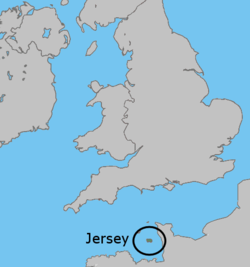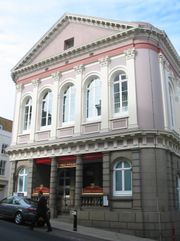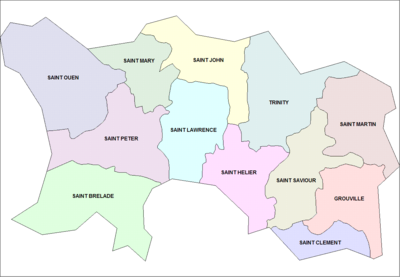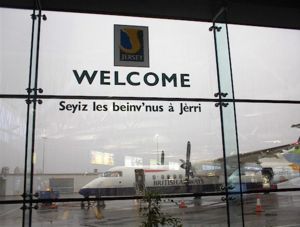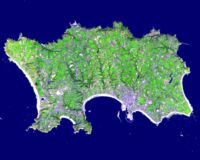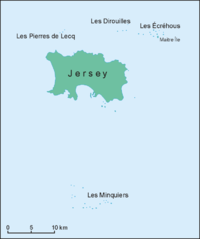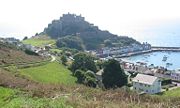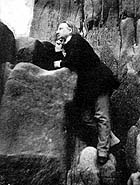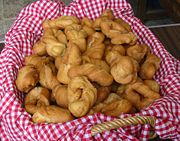Jersey
2008/9 Schools Wikipedia Selection. Related subjects: Geography of Great Britain
| Bailiwick of Jersey Bailliage de Jersey |
||||||
|---|---|---|---|---|---|---|
|
||||||
| Anthem: " God Save the Queen" (official) " Ma Normandie" ("My Normandy") (official for occasions when distinguishing anthem required) " Island Home" (proposed new official anthem as of May 2008) |
||||||
|
Location of Jersey (Dark Green)
|
||||||
| Capital (and largest city) |
Saint Helier |
|||||
| Official languages | English, French | |||||
| Recognised regional languages | Jèrriais | |||||
| Government | Parliamentary Democracy, Constitutional Kingdom, Crown dependency | |||||
| - | Chief of state | Elizabeth II, Duke of Normandy | ||||
| - | Lt. Governor | Lt. Gen. Andrew Ridgway | ||||
| - | Bailiff | Sir Philip Bailhache | ||||
| - | Chief Minister | Senator Frank Walker | ||||
| Status | British Crown dependency | |||||
| - | Separation from mainland Normandy |
1204 |
||||
| - | Liberation from German occupation |
9 May 1945 |
||||
| Area | ||||||
| - | Total | 116 km² ( 219th) 45 sq mi |
||||
| - | Water (%) | 0 | ||||
| Population | ||||||
| - | Dec 2007 estimate | 90,8001 ( 190th) | ||||
| - | Density | 7801/km² ( 12th²) 2,018/sq mi |
||||
| GDP ( PPP) | 2003 estimate | |||||
| - | Total | £3.6 billion ( 167th) | ||||
| - | Per capita | £40,000 (2003 estimate) ( 6th) | ||||
| HDI (n/a) | n/a (n/a) ( n/a) | |||||
| Currency | Pound sterling³ ( GBP) |
|||||
| Time zone | GMT | |||||
| - | Summer ( DST) | ( UTC+1) | ||||
| Internet TLD | .je | |||||
| Calling code | +44 spec. 44-1534 (landline) +44-7797 (Jersey Telecom mobile) +44-7700 (Sure mobile) +44-7829 (Airtel-Vodafone mobile) |
|||||
| Patron saint | St. Helier | |||||
| 1 | Jersey’s Resident Population 2007 | |||||
| 2 | Rank based on population density of Channel Islands including Guernsey. | |||||
| 3 | The States of Jersey issue their own sterling notes and coins (see Jersey pound). | |||||
The Bailiwick of Jersey ( Jèrriais: Jèrri) is a British Crown dependency off the coast of Normandy, France. As well as the island of Jersey itself, the bailiwick includes the nearly uninhabited islands of the Minquiers, Écréhous, the Pierres de Lecq and other rocks and reefs. Together with the bailiwick of Guernsey it forms the grouping known as the Channel Islands. The defence of all these islands is the responsibility of the United Kingdom. However, Jersey is part of neither the UK nor the European Union; rather, like the Isle of Man, it is a separate possession of the Crown. Jersey belongs to the Common Travel Area.
History
Jersey history is influenced by its strategic location between the northern coast of France and the southern coast of England; the island's recorded history extends over a thousand years.
Evidence of bronze-age and early iron-age settlements can be found in many locations around the island. While archaeological evidence of Roman influence has been found, in particular the coastal headland site at Le Pinacle, Les Landes, where remains of a primitive structure are attributed to Roman temple worship (fanum), evidence for regular Roman occupation has yet to be established.
Formerly under the control of Brittany and named Angia (also spelled Agna ), Jersey became subject to Viking influence in the ninth century, one of the "Norman Islands". The name for Jersey itself is sourced from a Viking heritage: the Norse suffix -ey for island can be found in many places around the northern European coasts. However, the significance of the first part of the island's toponym is unclear. Among theories are that it derives from jarth ( Old Norse: "earth") or jarl, or perhaps a personal name, Geirr, to give "Geirr's Island". Alternatively support for a Celtic origin can be made with reference to the Gaulish gar- (oak), ceton (forest). It is also said to be a corruption of the Latin Caesarea, the Roman name for the island, influenced by Old English suffix -ey for "island"; this is plausible if regional pronunciation of Latin implied that Caesarea was not IPA: [kaisarea] but [tʃeːsarea].
The island was eventually annexed to the Duchy of Normandy by William Longsword, Duke of Normandy in 933; his descendant, William the Conqueror, conquered England in 1066, which led to the Duchy of Normandy and the kingdom of England being governed under one monarch. The Dukes of Normandy owned considerable estates on the island, and Norman families living on their estates founded many of the historical Norman-French Jersey family names. King John lost all his territories in mainland Normandy in 1204 to King Philip II Augustus, but retained possession of Jersey, along with Guernsey and the other Channel Islands; the islands have been internally self-governing since.
Islanders became involved with the Newfoundland fisheries in the late sixteenth century. In recognition for all the help given to him during his exile in Jersey in the 1640s, Charles II gave George Carteret, bailiff and governor, a large grant of land in the American colonies, which he promptly named New Jersey, now part of the United States of America.
Trade laid the foundations of prosperity, aided by neutrality between England and France. The Jersey way of life involved agriculture, milling, fishing, shipbuilding, and production of woollen goods until nineteenth-century improvements in transport links brought tourism to the Island.
Jersey was occupied by Nazi Germany from 1 July 1940, and was held until 9 May 1945.
Politics
Jersey's legislature is the States of Jersey. It includes fifty-three elected members: twelve senators (elected for six-year terms), twelve constables (heads of parishes elected for three-year terms), twenty-nine deputies (elected for three-year terms); the Bailiff and the Deputy Bailiff (appointed to preside over the assembly and having a casting vote in favour of the status quo when presiding); and three non-voting members (the Dean of Jersey, the Attorney General, and the Solicitor General) appointed by the Crown. Government departments are run by a cabinet of ministers under a Chief Minister. The civil head of the Island is the Bailiff.
All current States Members have been elected as independents. Formally constituted political parties are unfashionable, although groups of "like-minded members" act in concert. Senators are elected on an Island-wide mandate and Deputies are elected in their local area.
The Jersey Democratic Alliance is the only party currently having States Members, although these were elected as independents. The Centre Party (Jersey) has committed to only proposing candidates for Senatorial elections, though members are free to, and have, stood for Deputy as independents. They would remain independent in the Chamber. Stuart Syvret is often reported to be of the Jersey Green Party.
The legal system is based on Norman customary law (including the Clameur de Haro), statute and English law; justice is administered by the Royal Court.
Elizabeth II's traditional title as head of state is that of Duke of Normandy, but she does not hold that title formally. She reigns by her position as Queen over a crown dependency. Her representative in the island is the Lieutenant Governor, who has but a token involvement in island politics. Since 2006, the incumbent Lieutenant Governor has been Lieutenant General Andrew Ridgway.
Parishes
Administratively, Jersey is divided into twelve parishes. All have access to the sea and are named after the saints to whom their ancient parish churches are dedicated:
- Grouville (historically Saint Martin de Grouville; incorporating Les Minquiers)
- Saint Brélade
- Saint Clement
- Saint Helier
- Saint John
- Saint Lawrence
- Saint Martin (historically Saint Martin le Vieux; incorporating Les Écréhous)
- Saint Mary
- Saint Ouen
- Saint Peter
- Saint Saviour
- Trinity
The parishes of Jersey are further divided into vingtaines (or, in St. Ouen, cueillettes), divisions which are historic and nowadays mostly used for purposes of local administration and electoral constituency.
The Constable (Connétable) is the head of each parish, elected at a public election for a three year term to run the parish and to represent the municipality in the States. The Procureur du Bien Public (two in each parish) is the legal and financial representative of the parish (elected at a public election since 2003 in accordance with the Public Elections (Amendment) (Jersey) Law 2003; formerly an Assembly of Electors of each parish elected the Procureurs in accordance with the Loi (1804) au sujet des assemblées paroissiales). A Procureur du Bien Public is elected for a mandate of three years as a public trustee for the funds and property of the parish and to be empowered to pass contract on behalf of the parish if so authorised by a Parish Assembly.
Centeniers are elected at a public election within each parish for a term of three years to undertake policing within the parish. The Centenier is the only officer authorised to charge and bail offenders. Formerly, the senior Centenier of each parish (known as the Chef de Police) deputised for the Constable in the States of Jersey when the Constable was unable to attend a sitting of the States. This function has now been abolished.
International relations
Although diplomatic representation is reserved to the Crown, Jersey negotiates directly with foreign governments on matters within the competence of the States of Jersey. Jersey maintains a permanent non-diplomatic representation in Caen, the Bureau de Jersey, and a branch office in Rennes. A similar office, the Maison de Normandie, in St. Helier represents the Conseil général of Manche and the Conseil régional of Basse-Normandie and hosts the Consulate of France.
Jersey is a member of the British-Irish Council, the Commonwealth Parliamentary Association and the Assemblée parlementaire de la Francophonie. Jersey is aiming to become a full member of the Commonwealth in its own right.
Dicey and Morris (p26) list the separate States comprising the British Islands: "England, Scotland, Northern Ireland, the Isle of Man, Jersey, Guernsey, Alderney, [Herm] and Sark. . . is a separate country in the sense of the conflict of laws, though not one of them is a State known to public international law."
In 2007, the Chief Minister and the UK Lord Chancellor signed an agreement which established a framework for the development of the international identity of Jersey. The agreement stated that:
- the UK has no democratic accountability in and for Jersey;
- the UK will not act internationally on behalf of Jersey without prior consultation;
- Jersey has an international identity which is different from that of the UK;
- the UK recognises that the interests of Jersey may differ from those of the UK, and the UK will seek to represent any differing interests when acting in an international capacity;
- the UK and Jersey will work together to resolve or clarify any differences which may arise between their respective interests.
In a survey of 700 people carried out by Channel Television in the summer of 2000, 68% supported independence from the United Kingdom. Senator (now Deputy) Paul le Claire lodged a projet calling for Jersey's independence shortly thereafter. Subsequently, the Jersey Law Review published an editorial and articles touching on the possibility of full independence. In 2007 the Chief Minister was reported as saying that Jersey had contingency plans in case independence were to be forced upon the Island or if Jersey wanted to move towards independence at a later date.
On 20 June 2007, Jersey signed an agreement regarding the exchange of information relating to tax matters. This was reported as the bailiwick's first tax treaty with a European state as a state in its own right (and the second after a similar agreement with the United States in 2002).
However, The Federal Court of Justice of Germany ruled on 1 July 2002 (case: II ZR 380/00), that under German law, for the purposes of § 110 of the German Civil Procedures Act (ZPO), Jersey is to be deemed to be part of the United Kingdom and of the European Union as well.
Geography
Jersey is an island measuring 118.2 square kilometres (65,569 vergée / 46 sq mi), including reclaimed land and intertidal zone. It lies in the English Channel, approximately 12 nautical miles (22 km/14 mi) from the Cotentin Peninsula in Normandy, France, and approximately 87 nautical miles (161 km/100 mi) south of Great Britain. It is the largest and southernmost of the Channel Islands.
The climate is temperate with mild winters and cool summers. The average annual temperature, 11.6 °C (52.9 °F) is similar to the South Coast of England while the mean annual total sunshine of 1918 hours is higher than anywhere in the United Kingdom. The terrain consists of a plateau sloping from long sandy bays in the south to rugged cliffs in the north. The plateau is cut by valleys running generally north-south.
Economy
Thanks to specialisation in a few high return sectors, at purchasing power parity Jersey has very high economic output per capita, substantially ahead of all of the world's large developed economies. The CIA World Factbook estimate of Jersey's GDP per capita for 2005 is US$57,000, which was beaten only by two other small states with similar economic characteristics, Bermuda and Luxembourg. Jersey's economy is based on financial services, tourism, electronic commerce and agriculture; financial services contribute approximately sixty percent of the Island's economy, and the Island is recognised as one of the leading offshore financial centres.
In June 2005 the States introduced the Competition (Jersey) Law 2005 in order to regulate competition and stimulate economic growth. This competition law was based on that of other jurisdictions.
Aside from its banking and finance underpinnings (and the finance industries supporting industries) Jersey also depends on tourism. In 2006 there were 729,000 visitors (down 3% on the previous year) but total visitor spending rose 1% to £222m. Duty-free goods are available for purchase on travel to and from the Island.
Major agricultural products are potatoes and dairy produce. The source of milk is Jersey cattle, a small breed of cow that has also been acknowledged (though not widely so) for the quality of its meat. Small-scale organic beef production has been reintroduced in an effort to diversify the industry.
Farmers and growers often sell surplus food and flowers in boxes on the roadside, relying on the honesty of those who pass to drop the correct change into the money box and take what they want. In the 21st century, diversification of agriculture and amendments in planning strategy have led to farm shops replacing many of the roadside stalls.
On February 18, 2005, Jersey was granted Fairtrade Island status.
Taxation
Until the twentieth century, the States relied on indirect taxation to finance the administration of Jersey. The levying of impôts (duties) was in the hands of the Assembly of Governor, Bailiff and Jurats until 1921 when that body's tax raising powers were transferred to the Assembly of the States, leaving the Assembly of Governor, Bailiff and Jurats to serve simply as licensing bench for the sale of alcohol (this fiscal reform also stripped the Lieutenant-Governor of most of his effective remaining administrative functions). The Income Tax Law of 1928 introducing income tax was the first law drafted entirely in English. Income tax has been levied at a flat rate of 20% for decades.
As VAT has not been levied in the Island, luxury goods have often been cheaper than in the UK or in France, providing an incentive for tourism from neighbouring countries. The absence of VAT has also led to the growth of the fulfilment industry, whereby low-value luxury items, such as videos, lingerie and contact lenses are exported to the UK, avoiding VAT on arrival and thus undercutting UK prices on the same products. In 2005, the States of Jersey announced limits on licences granted to non-resident companies trading in this way.
Although Jersey does not have VAT, on 13 May 2005, the States of Jersey approved the introduction of a goods and services tax (GST), scheduled for 2008.
The strategy for introducing the new GST tax is to fill a 'black hole' in the budget that is created by the introduction of a new 0/10 tax that replaces the old tax system that previously exempted foreign investors from corporation tax and levied a 20% rate on Jersey residents.
The new 0/10 tax exempts all businesses except those in financial services from having to pay any corporation tax (0%), while leaving the financial services to pay a low tax rate (10%). The income generated from the new 0/10 tax proposal will not be equal to the revenue of the original tax system and this leaves Jersey with a deficit in their budget of several million pounds.
To fill the deficit created by the changes made to Jersey's tax structure, the States of Jersey are introducing GST. GST will be added to most goods and services, which in effect will raise the cost of living for everyone in the island. The people hit the hardest by the new GST will be the people on the lowest incomes, however, to try to prevent islanders living below the poverty line, the States of Jersey are introducing an Income Support service in January 2008.
It is arguable that the people who will benefit from Jersey's new tax structure will be the owners of the large businesses that are separate or support the financial service based businesses. This is because they will not have to pay any corporation tax but will still benefit from the island's business.
Currency

Jersey issues its own Jersey banknotes and coins which circulate with UK coinage, Bank of England notes, Scottish notes and Guernsey currency within the Island.
Coinage
Designs on the reverse of Jersey coins:
- 1p Le Hocq Tower (coastal defence)
- 2p L'Hermitage, site where Saint Helier lived
- 5p Seymour Tower (offshore defence)
- 10p La Pouquelaye de Faldouet ( dolmen)
- 20p La Corbière lighthouse
- 50p Grosnez Castle (ruins)
Pound coins are issued, but are much less widely used than pound notes. Designs on the reverse of Jersey pound coins include historic ships built in Jersey and a series of the twelve parishes' crests. The motto round the milled edge of Jersey pound coins is Insula Caesarea (Latin: "Island of Jersey"). Two pound coins are issued also, but in very small quantities.
Demographics
The Island is host to a large number of people born outside Jersey; 47% of the population are not originally from the island.
Censuses have been undertaken in Jersey since 1821, the most recent being the 2001 Census on March 11.
Thirty percent of the population is concentrated in Saint Helier, the island's only town. Of the roughly 88,000 people in Jersey, around two-fifths are of Jersey/Norman descent and two-fifths of British (English, Scottish, Welsh and Northern Irish) descent. The largest minority groups in the island, after the British, are Portuguese (around 7%, especially Madeiran), Irish and Polish. The French community is also always present. The people of Jersey are often called Islanders, or in individual terms Jerseyman or Jerseywoman. Some Jersey-born people consider themselves British and value the special relationship between the British Crown and the Island, whereas a large number of pure Jersey people consider themselves more European, leaning towards the French. However, Jersey-borns consider themselves Islanders and say they are from Jersey, Channel Islands as opposed to England or the United Kingdom.
Religion in Jersey has a complex history and much diversity. The established church is the Church of England. In the countryside, Methodism found its traditional stronghold. A minority of Roman Catholics can also be found in Jersey, with two Catholic private schools ( De La Salle College in Saint Saviour being an all-boys Catholic school, and Beaulieu Convent School down the road in Saint Helier being an all-girls school where the sisters still have a presence in school life).
Jersey has an aging population. The main reason for this change particular to Jersey is the emigration of young people seeking opportunities the Island cannot provide.
Immigration
For immigration and nationality purposes the United Kingdom generally treats Jersey as though it were part of the UK. Jersey is constitutionally entitled to restrict immigration by non-Jersey residents, but control of immigration at the point of entry cannot, at present, be introduced for British, certain Commonwealth and EEA nationals without change to existing international law. Immigration is therefore controlled by a mixture of restrictions on those without residential status purchasing or renting property in the Island and restrictions on employment. Migration policy is to move to a registration system to integrate residential and employment status. Jersey maintains its own immigration and border controls. Although Jersey citizens are full British citizens, an endorsement restricting the right of establishment in European Union states other than the UK is placed in the Jersey passport of British citizens connected solely with the Channel Islands and Isle of Man. Those who have a parent or grandparent born in the United Kingdom, or who have lived in the United Kingdom for five years, are not subject to this restriction.
Historical large-scale immigration was facilitated by the introduction of steamships (from 1823). By 1840, an English invasion of up to 5,000, mostly half-pay officers and their families, had settled in Jersey.. In the aftermath of 1848, Polish, Russian, Hungarian, Italian and French political refugees came to Jersey. Following Louis Napoléon's coup of 1851, more French proscrits arrived. By the end of the 19th century, well-to-do British families, attracted by the lack of income tax, were settling in Jersey in increasing numbers, establishing St Helier as a predominantly English-speaking town.
Seasonal work in agriculture had depended mostly on Bretons and mainland Normans from the 19th century. The growth of tourism attracted staff from the United Kingdom. Following Liberation in 1945, agricultural workers were mostly recruited from the United Kingdom - the demands of reconstruction in mainland Normandy and Brittany employed domestic labour.
Until the 1960s, the population had been relatively stable for decades at around 60,000 (excluding the Occupation years). Economic growth spurred immigration and a rise in population. From the 1960s Portuguese workers arrived, mostly working initially in seasonal industries in agriculture and tourism.
A trend that has developed over the past few years is the setting up of recruitment agencies in a number of countries in the world, to employ either cheap labour (often from poor countries) or qualified/experienced labour. Amongst the countries that have been targeted for this type of recruitment are Poland, Nigeria, Australia, South Africa, Cyprus and Latvia.
Culture
Until the nineteenth century, indigenous Jèrriais — a variety of Norman French — was the language of the island, though French was used for official business. During the twentieth century, however, an intense language shift took place and Jersey today is predominantly English-speaking. Jèrriais nonetheless survives; around 2,600 islanders (three percent) are reckoned to be habitual speakers, and some 10,000 (12 percent) in all claim some knowledge of the language, particularly amongst the elderly in rural parishes. There have been efforts to revive Jèrriais in schools, and the highest number of declared Jèrriais speakers is in the capital.
The dialects of Jèrriais differ in phonology and, to a lesser extent, lexis between parishes, with the most marked differences to be heard between those of the west and east. Many place names are in Jèrriais, and French and English place names are also to be found. Anglicisation of the toponymy increased apace with the migration of English people to the island.
Some Neolithic carvings are the earliest works of artistic character to be found in Jersey. Only fragmentary wall-paintings remain from the rich mediaeval artistic heritage, after the wholesale iconoclasm of the Calvinist reformation of the sixteenth century.
Printing arrived in Jersey only in the 1780s, but the Island supported a multitude of regular publications in French (and Jèrriais) and English throughout the nineteenth century, in which poetry, most usually topical and satirical, flourished (see Jèrriais literature).
John Everett Millais, Elinor Glyn, and Wace are among Jersey's artistic figures. Lillie Langtry, the Jersey Lily, is the Island's most widely recognised cultural icon. The famous French writer, Victor Hugo, lived in exile in Jersey from 1852 to 1855.
The Island is particularly famous for the Battle of Flowers, a carnival held annually since 1902.. Annual music festivals include Rock in the Park, Avanchi presents Jazz in July, Jersey Live, the music section of the Jersey Eisteddfod. Other festivals include La Fête dé Noué (Christmas festival), La Faîs'sie d'Cidre (cidermaking festival), the Battle of Britain air display, food festivals, and Parish events.
The Island's patron saint is Saint Helier.
Food and drink
Seafood has traditionally been important to the cuisine of Jersey: mussels (called moules locally), oysters, lobster and crabs — especially spider crabs — ormers, and conger.
Jersey milk being very rich, cream and butter have played a large part in insular cooking. (See Channel Island milk) However there is no indigenous tradition of cheese making, contrary to the custom of mainland Normandy, but some cheese is produced commercially. Jersey fudge, mostly imported and made with milk from overseas Jersey cattle herds, is a popular food product with tourists.
Jersey Royal potatoes are the local variety of new potato, and the island is famous for its early crop of small potatoes from the south-facing côtils (steeply-sloping fields). They are eaten in a variety of ways, often simply boiled and served with butter.
Apples historically were an important crop. Bourdélots are apple dumplings, but the most typical speciality is black butter (lé nièr beurre), a dark spicy spread prepared from apples, cider and spices. Cider used to be an important export. After decline and near-disappearance in the late twentieth century, apple production is being increased and promoted. Apple brandy is also produced, as is some wine.
Among other traditional dishes are cabbage loaf, Jersey wonders (les mèrvelles), fliottes, bean crock (les pais au fou), nettle (ortchie) soup, vraic buns.
Sport
In its own right Jersey participates in the Commonwealth Games and in the bi-annual Island Games, which it last hosted in 1997.
In sporting events in which Jersey does not have international representation, when the British Home Nations are competing separately, islanders that do have high athletic skill may choose to compete for any of the Home Nations – there are, however, restrictions on subsequent transfers to represent another Home Nation.
Jersey is an affiliate member of the International Cricket Council (ICC). The Jersey cricket team plays in the Inter-insular match among others.
For horse racing, Les Landes Race Course can be found at Les Landes in St Ouen next to the ruins of Grosnez Castle.
The Jersey Football Association supervises football in Jersey. The Jersey Football Combination has 9 teams in its top division. The 2006/07 champions were Jersey Scottish where Ross Crick is the top scorer. The Jersey national football team plays in the annual Muratti competition among others.
Jersey has two public indoor swimming pools. Swimming in the sea, surfing, windsurfing and other marine sports are practised. Jersey Swimming Club have organised an annual swim from Elizabeth Castle to Saint Helier Harbour for over 50 years. A round-Island swim is a major challenge which a select number of swimmers have achieved. The Royal Channel Island Yacht Club is based in Jersey.
There are few facilities for extreme sports and youth sports such as skateboarding, BMX, and inline skating. Coastal cliffs provide opportunities for rock climbing.
Environment
Three areas of land are protected for their ecological or geological interest as Sites of Special Interest (SSI): Les Landes, Les Blanches Banques and La Lande du Ouest. A large area of intertidal zone is designated as a Ramsar site.
Jersey is the home of Durrell Wildlife (formerly known as the Jersey Zoological Park) founded by the naturalist, zookeeper, and author Gerald Durrell.
Biodiversity
Four species of small mammal are considered native: the wood mouse ( Apodemus sylvaticus), the Jersey bank vole ( Clethrionomys glareolus caesarius), the Lesser white-toothed shrew ( Crocidura suaveolens) and the French shrew ( Sorex coronatus). Three wild mammals are well-established introductions: the rabbit (introduced in the mediaeval period), the red squirrel and the hedgehog (both introduced in the 19th century). The stoat ( Mustela erminea) became extinct in Jersey between 1976 and 2000. The Green lizard ( Lacerta bilineata) is a protected species of reptile; Jersey is its only habitat in the British Isles.
Trees generally considered native are the alder ( Alnus glutinosa), silver birch ( Betula pendula), sweet chestnut ( Castanea sativa), hazel (Corylus avellana), hawthorn ( Crataegus monogyna), beech ( Fagus sylvatica), ash ( Fraxinus excelsior), aspen ( Populus tremula), wild cherry ( Prunus avium), blackthorn ( Prunus spinosa), holm oak ( Quercus ilex), oak ( Quercus robur), sallow ( Salix cinerea), elder ( Sambucus nigra), elm (Ulmus spp), and medlar ( Mespilus germanica). Among notable introduced species, the cabbage palm ( Cordyline australis) has been planted in coastal areas and may be seen in many gardens.


